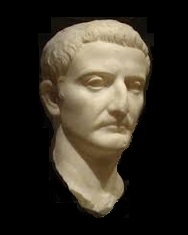14 AD - Augustus Caesar dies
11 January 49 BC proved a fateful day for the Roman Empire. Faced with a charge instigated by Pompey against him that would have permanently kept him out of power, Julius Caesar crossed the Rubicon and sparked off a civil war and the eventual murder of Pompey by an envoy of Ptolemy XIII when he fled to find refuge in Egypt. Julius Caesar's victory did not last long, for he was soon assassinated in 44 BC by Brutus and his associates. In his will Caesar named his 19-year-old grand-nephew as his son and heir. An intelligent and shrewd politician he soon outwitted his opponents and emerged the undisputed master of Rome when he routed the armies of Mark Anthony and Cleopatra at the Battle of Actium in 31 BC. Returning to Rome in 28 BC he convened the Senate and renouced all the dictatorial powers that were granted to him in the war against Anthony. Concerned that they might loose the leadership of an obviously capable general, the Senate urged him to carry on as consul and, in addition, conferred on him the title Augustus, "the revered one."
The Roman Empire underwent a transformation under Augustus Caesar. With a flair for winning friends and influencing people, he brought a personal touch to his exercise of power. Peace reigned, in most parts of the Empire at any rate and despite some attempts at his life. The economy bloomed, and the Empire rose to new heights of architectural and cultural achievements. In Judea, Herod the Great build the new port on the Mediterranean coast (began in 22 BC) and named it Caesarea in the Emperor's honour. Herod also rebuilt the ancient city of Samaria and renamed it Sebaste, Greek for "Augustus." Philip, Herod's son who inherited Galilee, built a new city in Paneas and named it Caesarea as well (usually referred to as Caesearea Philippi to distinguish it from his father's city on the coast). In recognition of his contribution the Senate conferred on him the title Pater Patriae, "Father of the Nation," in 2 AD, and on his death after 42 years of capital leadership the month of his death was named after him (19 August). He left no son of his own, and is succeeded by his adopted son Tiberius.

Tiberius was a very different kettle of fish from his adoptive father. Socially uncomfortable he never worked well with the Roman Senate whom (according to the testimony of the later Roman historian Tacitus) he ridiculed as "men fit to be slaves" and, increasingly, became more and more draconian in his rule, often invoking the lex maiestatis, the law of high treason, to silence those who opposed him. He turned paranoic in his later years, reclusing himself on the island of Capri, engrossed in astrology. Under his rule, Jesus grew into adulthood, and it was in the charge of Pontius Pilate, Tiberius' appointee in Judea, that Jesus was handed over to the Jewish authorities for crucifixion. Tiberius died on 16 March 37 AD.1

Footnotes
1. Tiberius, however, was honoured by Herod Antipas, son of Herod the Great and tetrach of Galilee, when he built a new city on the western shores of Lake Galilee and named it Tiberias. It became the capital of his realm.

Low Chai Hok
©Alberith, 2014